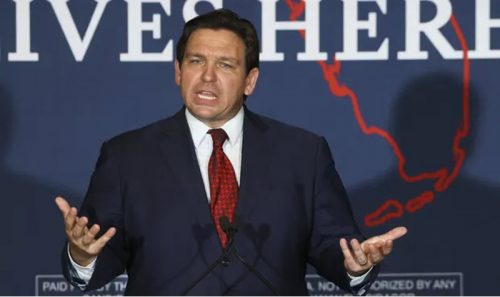

By Amy Berberyan and Citlalli Florez
MARTHA’S VINEYARD, MASS – Immigrants who fled from Venezuela, and had active federal proceedings to adjudicate their immigration status, were coerced Sept. 14 into traveling to Martha’s Vineyard under the false notion they would receive humanitarian assistance, according to a lawsuit filed here this week.
Alianza Americas, a not-for-profit organization that focuses on bettering the quality of life of Latino immigrant communities, said three recent Venezuelan migrants affected by fake promises filed a lawsuit. These plaintiffs are known as “Yanet Doe,” “Pablo Doe,” and “Jesus Doe.”
The lawsuit was filed against Ronald DeSantis, the current governor of Florida; Jared W. Perdue, the current secretary of the Florida Department of Transportation; the State of Florida; the Florida Department of Transportation, and five unidentified suspects dubbed “Doe(s) #1-5.”
According to the plaintiffs, the defendants in early September developed a scheme to exploit the vulnerability of the immigrants involved to advance their own financial and political interests.
The five Doe defendants aided in advancing this scheme.
The Doe defendants allegedly trolled the streets outside the migrant shelter in Texas and other similar locations. They pretended to offer humanitarian assistance and, according to the case documents, “provided items such as $10 McDonalds gift certificates” to gain the plaintiffs’ trust.
However, the gift certificate was only given after the plaintiff had signed a document. The defendants did not explain what was in the document and a portion of it, including details of transportation and liability, was not translated to Spanish.
Copies of immigration paperwork were also requested to confirm each migrant’s immigration status. According to the plaintiffs, “if the class members’ immigration paperwork fit the bill, the Doe Defendants engaged in further acts to lure them into being objects of the Defendants’ political agenda.”
The Doe defendants, the filing notes, proceeded to make false promises to the plaintiffs and other migrants, claiming they would receive employment, housing, educational opportunities, immigration status assistance and other forms of aid if they were willing to board planes to other states.
The migrants were “sequestered” in hotels, for free, away from migrant centers and other people, said lawyers, who believe they were kept there until the defendants had rounded up enough passengers to fit two privately chartered planes. The planes carried approximately 50 passengers, all of which were migrants.
The lawsuit maintains passengers, including the plaintiffs, were given red folders with official-looking documents for an organization, including a brochure titled, “Massachusetts Refugee Benefits.” It is believed this brochure was modeled after another governmental program for which the migrants did not qualify.
The plaintiffs said they were told they would be transported into Washington D.C., Boston, Massachusetts or another “sanctuary state.” During the flight, the plaintiffs were then informed that they would be landing in Martha’s Vineyard instead.
Confused and distraught, the plaintiffs said they tried to contact defendants Doe #1 and Doe #2 through a phone number which was given to them before their departure. Neither defendant picked up the phone and they appeared to have abandoned the plaintiffs.
No arrangements had been made for the plaintiffs before arriving at Martha’s Vineyard and they were left without housing and employment, the suit insists, adding the promises made to them by the Doe defendants had been false and it is thought no one in Massachusetts knew they were coming.
On Sept. 15, the day after the incident, Florida Gov. DeSantis admitted to orchestrating the flights as part of a relocation program which targets immigrants, stating, “We are not a sanctuary state, and we will gladly facilitate the transport of illegal immigrants to sanctuary jurisdictions.”
DeSantis claimed to reporters to have funded the scheme out of $12 million appropriated by the Florida Legislature to Florida’s Department of Transportation. He also confirmed that he will continue doing the same thing until all of these funds have been exhausted.
Several factors related to the plaintiffs’ native country made them especially susceptible to coercion, apparently. According to the U.S. Department of State, Venezuela has reached a “Do Not Travel” advisory notice “due to crime, civil unrest, poor health infrastructure, kidnapping, …terrorism, and wrongful detentions.”
Similarly, “extraordinary…conditions…prevent Venezuelan nationals from returning [to Venezuela] in safety includ[ing] severe economic and political crises, …which have an impact across sectors,” said the pleading, adding Venezuelan citizens experience “limited access to food, basic services, adequate healthcare, and the deterioration of the rule of law and protection of human rights.”
In addition to this, Amnesty International found that “crimes under international law and human rights violations, including politically motivated arbitrary detentions, torture, extrajudicial executions, and excessive use of force have been systematic and widespread.”
Plaintiffs Yanet Doe, Pablo Doe and Jesus Doe were all born in Venezuela and reached the U.S. border near Piedras Negras, Mexico with their respective families where they surrendered to border officials, explained their lawyers, noting Yanet Doe, together with her husband and son, was detained for about six days before taking a bus to San Antonio, Texas. Her family faces ongoing immigration proceedings in Texas. Upon arriving in the state, they were redirected to a shelter they stayed at for three days.
Near the shelter, according to the legal action, they encountered Defendant Doe #1, who self-identified as “Perla.” Perla was offering her help to those outside the shelter, and shared her contact information with Yanet Doe. After Yanet Doe contacted her, Defendant #1 asked for her family’s immigration notices.
Though this worried Yanet Doe, she cooperated because she “believed that the Defendant was genuinely trying to assist her and her family.” Afterwards, Defendant #1 deposited the family at a hotel.
She promised a flight that would provide the plaintiff with “permanent housing, work, educational resources for her son, and help changing her address for immigration proceedings.” Defendant #1 also mentioned the flight would “likely go to Washington, D.C. or another ‘sanctuary state.’”
Yanet Doe learned the plane would land in Massachusetts only after she was on it. No one awaited her family once they landed, and they had nowhere to go. Furthermore, the plaintiff was concerned her entire family would be deported in absentia due to being “unable to keep their scheduled appointments.”
The lawsuit alleges that, “as a direct and proximate cause of the Defendants’ conduct, Plaintiff Yanet Doe and her family have suffered emotional and economic harm, and irreparable harm to their dignity and autonomy.”
She reports that, if her family had known the truth of the situation—that they were not only lied to about their prospects upon boarding the plane but also were being used as a political ploy—they would not have gone on the flight.
Plaintiff Pablo Doe fled Venezuela with his two brothers and was detained for 15 days. Post-release, they spent three days at a shelter in San Antonio.
When the brothers left the shelter, they encountered Doe Defendants #1 and #2, who claimed they “worked for an ‘anonymous’ person who helped immigrants reach sanctuary states.”
The defendants promised the plaintiff and his family “monetary assistance, housing, immediate employment, food assistance, clothing, free English classes, and legal assistance with their continuing immigration proceedings” in order to coerce them onto the flight to Martha’s Vineyard.
When they arrived, no one was present to help them and Defendant Doe #1 was not responding to calls, the lawsuit asserts, adding, “as a direct and proximate result of the Defendants’ conduct, Plaintiff Pablo Doe and his brothers have suffered emotional and economic harm, and irreparable harm to their dignity and autonomy.”
Like Plaintiff Yanet Doe, Plaintiff Pablo Doe and his brothers would not have agreed to the flight if they knew the real circumstances around it, they said.
A similar situation occurred with Plaintiff Jesus Doe, who was approached by “Perla” after leaving his shelter, San Pedro 7000. She told him she could get him a flight to Washington, D.C., or Boston, as well as a hotel room, and the suit charges on Sept. 14 at 7 a.m. Plaintiff Jesus Doe and several other immigrants were promised they would receive a $10 McDonald’s gift card.
The lawsuit states that “she did not explain what the document stated, and it was not completely translated to Spanish: an entire paragraph about liability and transport was not translated at all, and language specifying that the journey would take place from Texas to Massachusetts was not translated at all either.”
Plaintiff Jesus Doe said he was told he would receive a gift card for filling in his information, but was given no time to read the document and received no explanation as to what its contents were.
Upon taking the flight, he said, he was promised “permanent housing, stable employment, and help with his immigration process.” He received none of these upon arriving in Martha’s Vineyard and his voice message, sent to Defendant Doe #1, was never answered.
According to the lawsuit, “Plaintiff Jesus Doe feels defrauded and tricked. The experience of being transported to Martha’s Vineyard under false pretenses was traumatizing to him. Plaintiff Jesus Doe is concerned that this experience will also negatively impact his son in Venezuela.”
According to the court filing relating to the migrants’ relocation to Martha’s Vineyard, the plaintiffs believe there were numerous violations under the law committed by the defendants.
The Fourteenth and Fourth Amendments of the Constitution are believed to have been violated under the context of illegal seizure and false arrest. The defendants seized the plaintiffs and other migrants without just cause, said the suit, claiming the plaintiffs were not free to leave after boarding the planes because of false pretenses.
The suit insists the Fourteenth Amendment’s Due Process Clause which prohibits depriving “any person of life, liberty, or property, without due process of law” was violated as well. The defendants deprived the freedom of movement without just cause and stripped the plaintiffs of their human dignity.
Because the plaintiffs were transported “thousands of miles away from the location of their federal immigration proceedings under false pretenses-including false promises to assist them with immigration issues” there was further deprivation of these rights, said lawyers.
Other causes of action include violation of the Supremacy Clause, engaging in a Civil Rights Conspiracy, False Imprisonment, Fraud/Deceit, Intentional Infliction of Emotional Distress and Negligent Infliction of Emotional Distress.
Because Governor DeSantis allegedly used the funds originating from the federal Coronavirus State Fiscal Recovery Fund, which has restrictions for its use, he violated such federal stipulations which is also a cause of action, plaintiffs assert in their filing.
The plaintiffs are requesting the court to consider a compensatory award for the emotional distress and punitive damages caused to the individuals involved, the covering of the plaintiffs’ attorneys’ fees and costs, and any other form of relief which the court may deem proper.